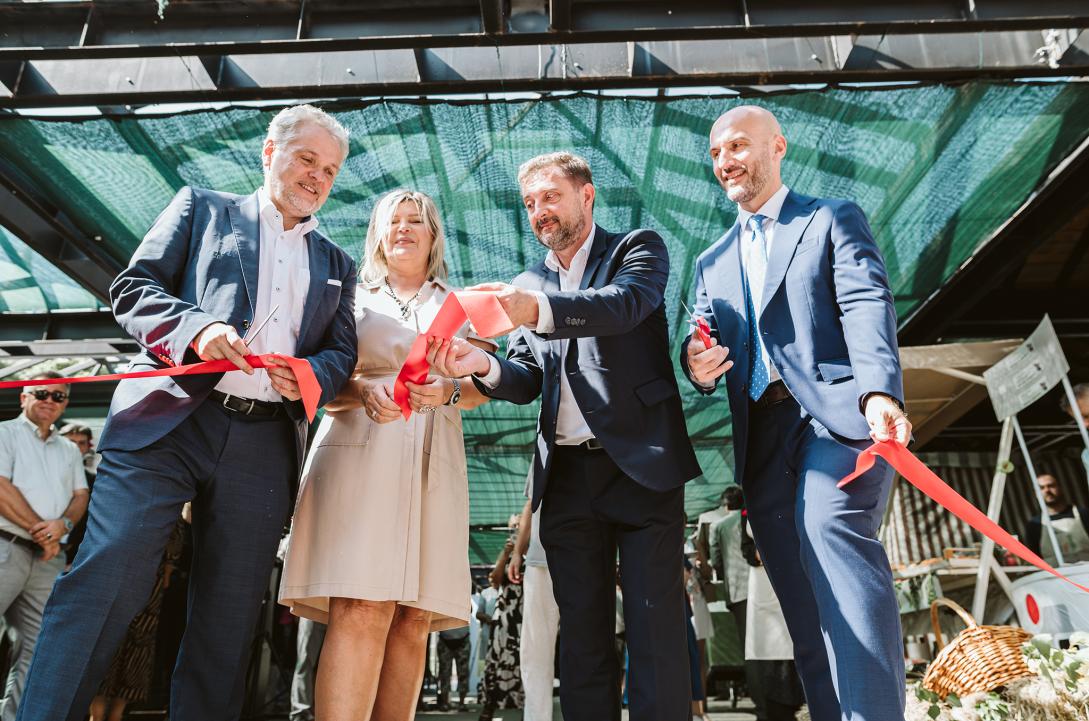EU4AGRI Develops Market Rural Infrastructure: Mala Tepa City Market Revamped

As part of the EU program EU4AGRI, which supports agricultural competitiveness and rural development in Bosnia and Herzegovina, the European Union has aided the development of new market infrastructure in Mostar. At the Mala Tepa market, one of the oldest green markets in Herzegovina, located in the old part of Mostar, 21 modular kiosks, 10 mobile stands for seasonal markets and street fairs, and kiosks connected to the electrical grid have been installed.
This initiative, for which the European Union provided more than 180,000 KM, represents a crucial step towards enhancing market infrastructure and improving the quality of life for Mostar's residents. Alongside the establishment of mobile sales points, specialized training on marketing, food regulations, sanitary standards, and safe product handling has been conducted.
“It is a great pleasure to be here in Mostar today to open the Mala Tepa market. Agriculture holds special importance for us, and that is why the European Union ensures significant investments in this sector. Over the past five years, we have intensified our investments, among other things, through the EU4AGRI project, which has supported nearly 2,000 end-beneficiaries so far, including this city market in Mostar. We have improved working conditions and hygiene standards at this traditional location, and I am pleased that we had the opportunity to support new market infrastructure, which will benefit the citizens of Mostar and many tourists,” stated Johann Sattler, Head of the European Union Delegation to Bosnia and Herzegovina and the EU Special Representative in Bosnia and Herzegovina.
The EU4AGRI project is primarily funded by the European Union (EU) under the Instrument for Pre-Accession Assistance (IPA). Worth EUR 20 million, the project is implemented and co-funded jointly by United Nations Development Programme (UNDP) and Czech Development Agency (CzDA).
“This extraordinary project provided a fantastic opportunity to renovate the market, which, with improved technological and sanitary conditions, will have a new face and attract more tourists. They will be able to experience hospitality and local, organic products. The project began during the dark months of the COVID-19 pandemic with the aim of restoring and improving the economic situation, emphasizing the green transition as a key element for further development. Within the program, we worked on building the capacities of farmers, providing them with financial support and using European technology and innovations,” said Victor Munteanu, Deputy Resident Representative of the United Nations in Bosnia and Herzegovina (UNDP in BiH).
As part of the EU4AGRI project, market infrastructure has been improved not only in Mostar and Trebinje but also in Banja Luka, Bihać, Gračanica, Mrkonjić Grad, Bosanski Petrovac, Rudo, Gradiška, Zenica, Teslić, and Šamac. The total investment value for all 12 supported local government units (municipalities and cities) amounts to more than 2.3 million KM, of which the European Union financed about 1.6 million KM.
The Mayor of Mostar, Mario Kordić, also emphasized the importance of this initiative: “Tepa holds a special place in the hearts of all Mostar residents, as one of the few places that connect us to memories and history. This market, once a gathering place for selling local agricultural products, is now getting a new face. In cooperation with the European Union, UNDP, and the Czech Development Agency, we are working on modernizing Tepa to include it in Mostar's tourist offer. Our farmers will soon have the opportunity not only to sell but also to process their products on-site, providing visitors with an authentic Herzegovina experience.”
Zejna Šanjević-Kussmaul, one of the final beneficiaries of the EU4AGRI project from the Women's Association "Univerzum," emphasized: "Among the many activities our association engages in, economic empowerment of women is one of the most significant. Our women create authentic products that are not imported and have no competition. This is something the city should be proud of, and we thank the European Union for the opportunity to showcase the work of our women."
For more information about the EU4AGRI project and its activities, visit the website: eu4agri.ba.
